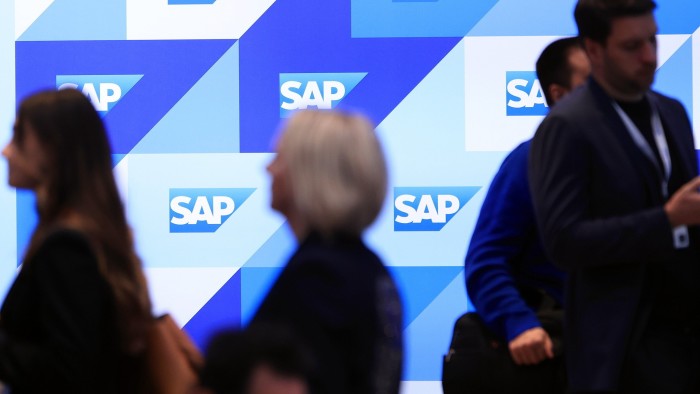Unlock the Editor’s Digest for free
Roula Khalaf, Editor of the FT, selects her favourite stories in this weekly newsletter.
SAP’s chief said it had seen a rise in the number of clients asking whether Europe’s biggest software group was “flexible” in switching cloud providers amid growing fears over a global trade war.
Christian Klein told the Financial Times that rising geopolitical tensions and trade conflicts had fuelled customer anxiety over cloud infrastructure choices, boosting the concept of “sovereign” data centres where information remained within national borders.
“There have been customers who’ve asked, ‘If things escalate further, will you be flexible?’,” said Klein.
SAP, Europe’s most valuable listed company, operates its own data centres in partnership with four cloud hyperscalers — Amazon, Google, Microsoft and Alibaba — to host its software.
While Klein warned against a “too ideological” approach to data security, he said EU governments needed to create a common framework for sovereign clouds to allow for scale and reduce regulatory complexity.
SAP is expanding its sovereign cloud services in Germany, France and elsewhere in Europe. It is also in talks with four Asian countries including Singapore and India.
The software group already runs these services for public sector clients in the “Five Eyes” intelligence alliance — which includes the UK, US, Canada, Australia and New Zealand.
Klein’s comments came as SAP’s shares surged more than 10 per cent on Wednesday following a better than expected first-quarter earnings report, boosted by its pivot to cloud services and sweeping cost cuts.
Adjusted operating profit rose to €2.5bn, well ahead of consensus estimates of €2.2bn, and up 60 per cent from the same period last year. The rebound helped recover some of the €50bn in market capitalisation lost since SAP’s February peak.
The strong performance was driven by a shift from traditional software licensing to cloud-based subscriptions and the effects of a €3bn AI-focused restructuring programme, which included about 10,000 job cuts.
Overall Klein said SAP’s cloud pipeline remained “very solid”, particularly among clients navigating regulatory and supply chain pressures.
Its current cloud backlog — a metric tracking contractually committed cloud revenue over the next 12 months — rose 29 per cent year on year on a constant currency basis to €18.2bn.
Notably, carmakers including Hyundai, Kia and Mazda — hit hard by global trade frictions — adopted SAP’s cloud services in the quarter, a move analysts at Deutsche Bank said highlighted the company’s “resilience” and role in helping customers optimise costs and productivity through supply chain tools and AI.
SAP reaffirmed its 2025 targets, forecasting cloud revenue growth of 26 to 28 per cent to between €21.6bn and €21.9bn, and adjusted operating profit growth of 26 to 30 per cent to between €10.3bn and €10.6bn.
While the group has so far avoided direct exposure to US tariffs, Klein acknowledged the uncertainty: “Everyone is keeping a close eye on what happens in the next 90 days,” he said, referencing a temporary suspension of duties by US President Donald Trump.
